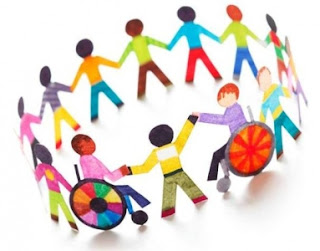 |
| The society should not view us as a burden |
In the interest of self-control, suitable replies to the
overly insensitive question raced through my mind. “Why don’t you ask my
parents!”, I thought to myself.
The more I thought of what to answer the more painful it
became. It then dawned on me that this was actually the reality of children
with different abilities. We are viewed as a burden to society, throughout the
course of our lives.
There I was, all grown up, comfortably capable of checking
myself into such interviews, a graduate nonetheless, and yet, the same
prejudice still plagued me. Tears flowed as I attempted to answer her question.
I recently visited a well-known children’s home that has
hosted children with different abilities for decades. They were in the process
of closing down the home.
The Children’s Act 2017, Kenya, stipulates that all
children’s homes are to be closed and the children integrated back into their
respective families and communities.
“A child belongs to the village,” reads what I think is one
of the greatest African sayings. However, as the close-down continued, it
became apparent that a child with ‘disabilities’ does not belong to the
village.
“Is there another school or place I can take her? This child
is too much work. Who will take care of her?” These are some of the questions that parents who were clearly desperate, asked.
 |
| Worried parents. |
I remember asking myself, “What if there was a place where ‘disabled’ children could be taken and forgotten about? What would happen to
us?” Based on some of those desperate questions, I almost cried because I already knew
what the answer was.
Susan Hampshire, a famous actress who struggled with words,
once said that it is a lonely existence to be a child with a ‘disability,’ which
no one can see or understand. You exasperate your teachers, you disappoint your
parents, and worst of all, you know that you are not just stupid.”
Sometimes I feel as though miss Hampshire was talking
directly at me and those like me. I was born with cerebral palsy (CP), a
congenital condition affecting a person's movement. Despite the CP, I believe that I have grown
into a responsible citizen. I cook for my siblings and pay my taxes.
During the interview, I could easily have turned the
question around: “Do you think they (my parents) were or are a burden to me?”
However, it is not a competition of who is a burden or not.
 |
| We have a lot to offer |
The question really is, “can we co-exist in a manner
sensitive to each other’s needs?” I believe people with different abilities
have a lot to offer the society, if it begins to view us positively.
Children with different abilities are not a burden to their
families and they must never be viewed as such. Sometimes it is the very
society that should embrace them, that causes them to be alienated by their
families.
This is especially so when insensitive comments are
constantly made. At times, even tagged alongside the talk of curses and black magic
and as we all know, a lie told to many times ultimately becomes the truth.
Unfortunately, some children with different abilities have
grown up believing that they are indeed a burden to their families going by the
way in which they have been raised.
From my various interactions with those like me, I know it is a very painful thing to go through in one's life. I believe we can do better as a society.
From my various interactions with those like me, I know it is a very painful thing to go through in one's life. I believe we can do better as a society.
A disabled child means your family is cursed and other such
backward narratives should not have a place in modern society. We must seek to
be more informed in order to arrest the stigma.
We must also prop our institutions to be more inclusive of
people with different abilities, whether in terms of accessibility or funding.
The lack of inclusion also plays a role in society residing that people with
different abilities do not belong.
To my brothers and sisters with different abilities, you are
not a burden. You never have been and never will. You are fearfully and
wonderfully made. Always remember that.
I must say also, that I have been privileged to belong to a
family with parents, including my mum and dad, that have loved, supported and
appreciated me every step of the way. I have turned out great. A heart-felt
thank you to them. It is my prayer that other parents will do likewise.
Njeri Maria - Founder, Njeri Maria Foundation
With contributions from Aaron Ogunde.
Comments
Post a Comment